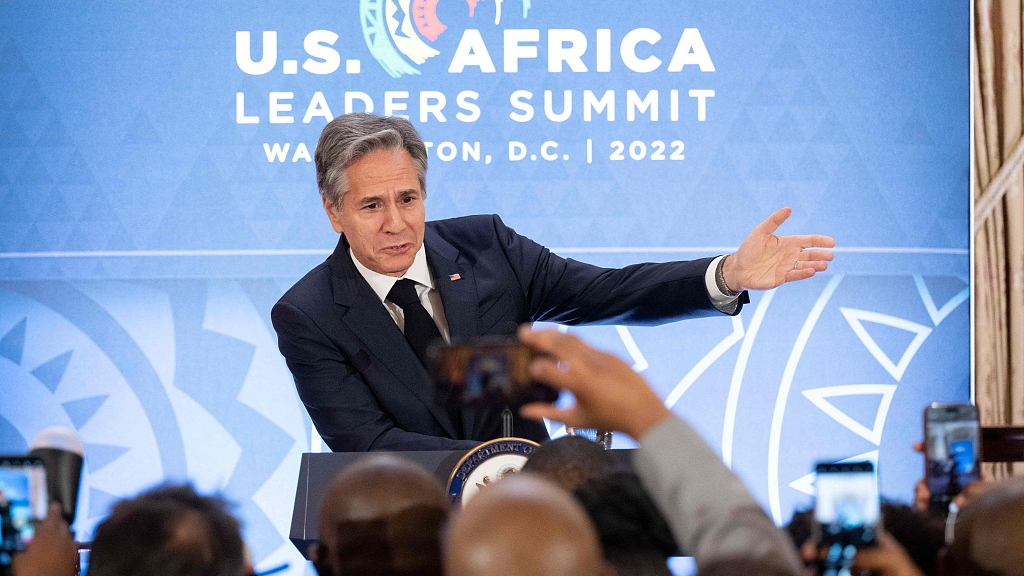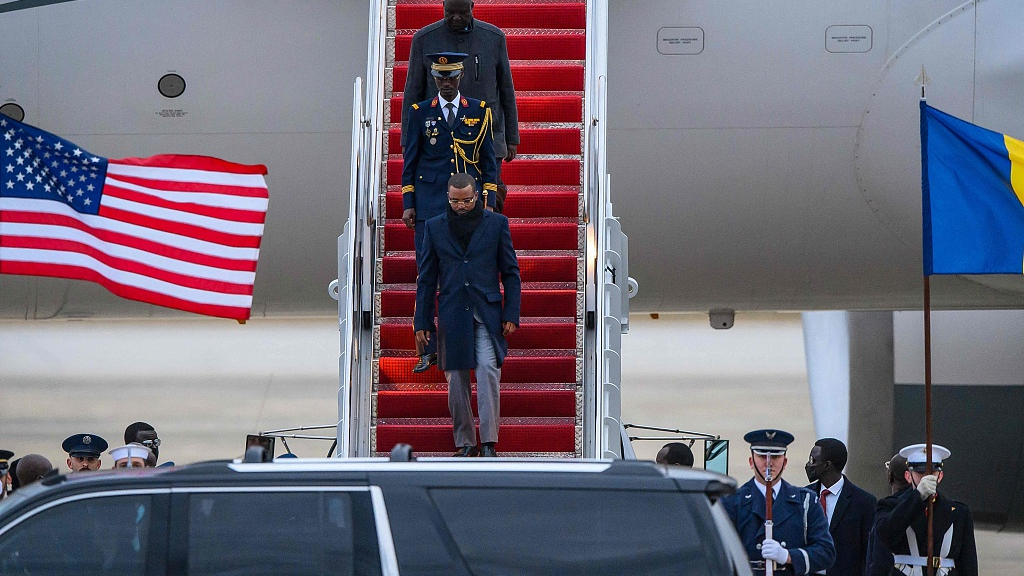
U.S. Secretary of State Antony Blinken speaks during the Innovators Gathering of the U.S.-Africa Leaders Summit at the State Department in Washington, December 12, 2022. /CFP
U.S. Secretary of State Antony Blinken speaks during the Innovators Gathering of the U.S.-Africa Leaders Summit at the State Department in Washington, December 12, 2022. /CFP
Editor's note: William Jones is a former White House correspondent for Executive Intelligence Review and a non-resident fellow of the Chongyang Institute for Financial Studies, Renmin University of China. The article reflects the author's opinions, and not necessarily those of CGTN.
The United States will hold an unprecedent three-day U.S.-Africa Leaders Summit in Washington this week, with up to 50 African leaders attending. Along with traffic gridlock on the streets of Washington, there will no doubt be a cavalcade of events celebrating this amazing display of diplomatic splendor.
But why Africa? And why now? In U.S. diplomatic practice, with wars in the Middle East, the emergence of Asia-Pacific as the realm of future economic growth, and rivalry with China, Africa suddenly shoots to the top of the U.S. political agenda. Secretary of State Antony Blinken has spent a lot of time in Africa recently, primarily to assure the African nations that the U.S. has not abandoned them, and to warn them against economic and other initiatives coming from China.
While African leaders will come – and who can refuse an invitation from a U.S. President – there will no doubt be a great deal of skepticism over the motives and the intent of this gala event. The plight of Africa has largely been ignored by U.S. administrations. The White House statement notes that the U.S. relationship with Africa goes back to John F. Kennedy. Kennedy indeed had real empathy with Africa, giving speeches about it even while he was a congressman.
Since then, the policy of the U.S. has largely been that of casting alms to the most devastated countries and insisting that African countries adhere to so-called democratic norms as defined by the United States. Since the time of Kennedy, there have been few moves from the U.S. side to encourage African development, with Washington largely relying on the workings of the alleged "free market" and the all-purpose "trickle-down economics" to do the job. Well, it didn't.
No one in the West was terribly concerned about Africa, until Chinese investment, which had been in Africa since the 1960s, began to actually help lift African countries out of the vicious circle of poverty. Since 2010, China has become the biggest investor in Africa. Particularly since the launch of the Belt and Road Initiative (BRI) in 2013, China has focused on infrastructure projects, which not only create jobs, but also provide the basis for further economic development.
It is not expected that we will see any infrastructure proposals coming out of the Washington conference. The U.S. government is no longer in the business of building railroads. The Joe Biden administration will do everything it can, perhaps, to get private businesses to "step up" and do something for Africa, but they have less influence on that matter than the New York Stock Exchange.

Chad Transitional President Mahamat Idriss Deby Itno (front) arrives at Joint Base Andrews in Maryland to attend the U.S.-Africa Leaders Summit, December 12, 2022. /CFP
Chad Transitional President Mahamat Idriss Deby Itno (front) arrives at Joint Base Andrews in Maryland to attend the U.S.-Africa Leaders Summit, December 12, 2022. /CFP
It's really difficult to see what, if any, "deliverables" will be forthcoming from this gala three-day performance. Perhaps there will be some assistance in dealing with COVID-19 or with the pending food crisis, which they are blaming on Russia, not on the U.S., and the EU has banned Russian ships from their ports. Part of the political game here is to get countries to condemn Russia for the war in Ukraine, which African leaders, having seen the origin of the Russian decision, have been averse to do.
There will also be the usual warnings about working with China on infrastructure – or on anything else for that matter. At the same time, there will be a lot of beautiful speeches about the importance of Africa as a "geopolitical player." But most of the leaders coming to Washington know that this whole arrangement is all about "geopolitics."
While they would be more than happy to have help from the United States in coping with the major dilemmas facing them, there will be few illusions that such aid will be forthcoming, or that any such aid would be free from "conditionalities." There will be a lot of rhetoric about the sacrosanct nature of the "rules-based system," none of whose rules have been set by African nations. But as they leave the U.S. capital, they will still be motivated chiefly by their own national interest. And that interest can only be served by not playing a "toady" to U.S. geopolitical interests.
The several decades in which China has cultivated a close working relationship with African nations cannot be upstaged by three days of festivities and high-flown speeches in Washington, D.C. The world has changed over the last few decades, and while politicians in Washington have not seemed to have noticed, the rest of the world has changed, and they will not return to "business as usual" when there is now a chance for breaking the great cycle of poverty that has been their lot for all too long.
(If you want to contribute and have specific expertise, please contact us at opinions@cgtn.com. Follow @thouse_opinions on Twitter to discover the latest commentaries in the CGTN Opinion Section.)